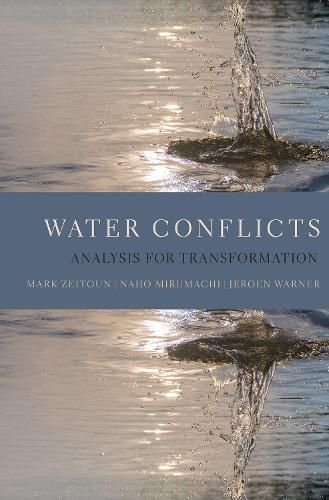Readings Newsletter
Become a Readings Member to make your shopping experience even easier.
Sign in or sign up for free!
You’re not far away from qualifying for FREE standard shipping within Australia
You’ve qualified for FREE standard shipping within Australia
The cart is loading…






Water Conflicts applies cutting-edge thinking to identify pathways that can transform complex water conflicts. It challenges existing power-blind and politics-lite analysis that is very deeply-held and recurring in debates that suggest causal links between scarcity and violence-or peace. This book presents a much needed revision of transboundary water analysis, leading to a rethink on the way water is used and contested, with a focus on harm experienced both by the most vulnerable water users and the environment. Recognizing that conflicts are never static, Mark Zeitoun, Naho Mirumachi, and Jeroen Warner’s transformative analysis provides multi-disciplinary tools and perspectives to understand and address the complexities involved. The approach is stress-tested through dozens of examples around the globe, and it incorporates collective evidence and knowledge of the London Water Research Group. The insights on water diplomacy will be most welcome by analysts, activists, diplomats, and all others tackling water conflicts. Seeking to motivate improvement of transboundary water arrangements towards further equity and sustainability as a practical agenda, the book is a fresh antidote to the detached role that researchers and policymakers often play.
$9.00 standard shipping within Australia
FREE standard shipping within Australia for orders over $100.00
Express & International shipping calculated at checkout
Water Conflicts applies cutting-edge thinking to identify pathways that can transform complex water conflicts. It challenges existing power-blind and politics-lite analysis that is very deeply-held and recurring in debates that suggest causal links between scarcity and violence-or peace. This book presents a much needed revision of transboundary water analysis, leading to a rethink on the way water is used and contested, with a focus on harm experienced both by the most vulnerable water users and the environment. Recognizing that conflicts are never static, Mark Zeitoun, Naho Mirumachi, and Jeroen Warner’s transformative analysis provides multi-disciplinary tools and perspectives to understand and address the complexities involved. The approach is stress-tested through dozens of examples around the globe, and it incorporates collective evidence and knowledge of the London Water Research Group. The insights on water diplomacy will be most welcome by analysts, activists, diplomats, and all others tackling water conflicts. Seeking to motivate improvement of transboundary water arrangements towards further equity and sustainability as a practical agenda, the book is a fresh antidote to the detached role that researchers and policymakers often play.